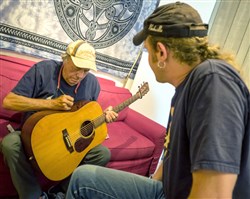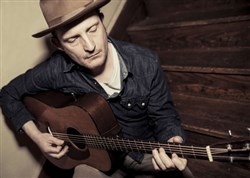VOL. 41 | NO. 12 | Friday, March 24, 2017
Does a Bare inspire in the woods? This one did

Bobby Bare, whose music, voice and persona drew Thomm Jutz to Nashville and U.S. citizenship, is the only person Jutz has ever allowed to sign his guitar.
-- Photograph Courtesy Of Paul SchatzkinIf it wasn’t for my old friend and hero, Bobby Bare, I’d not have a column this week.
Well, maybe there’d be a column. But it wouldn’t be about the young boy in the living room of his family’s home in Germany’s Black Forest – sort of a fairy-tale setting, actually – who sat transfixed as he watched Bare’s flickering image on television. It set the course for Thomm Jutz’s life.
“I saw Bobby Bare on TV when I was 11 or 12,” says Thomm, whose songs currently are at and/or near the top of the “Bluegrass Today” charts.
No. 1 is “Going Back to Bristol,” performed by Shawn Camp, a song Thomm wrote along with Peter Cooper and Mac Wiseman (also very important friends of this decrepit, old scribbler) for an album chronicling the latter’s long life and mostly good times: “I Sang the Song.”
That Mountain Fever Records disc is a story-song cycle detailing Mac’s 91 years. Some of Nashville’s best musicians bring to life the songs the trio wrote.
And as of this writing, another song written by Jutz, “I’m a Wanderer,” performed by Chris Jones & The Night Drivers, is holding the No. 3 spot on the charts.
“Last week it was No. 2,” adds Thomm, who co-wrote the song with Charlie Stefl and Jon Weisberger. The trio composed the song at the 47-year-old former German’s TJ Tunes recording studio – a favorite spot for acoustic musicians to recreate and create – tucked in a rural stretch south of Mt. Juliet.
By the way, Thomm’s unusually spelled first name was not the one his parents gave him when he was christened in Neusatz, his small hometown in the Black Forest.
“My name is Thomas,” he says, noting that somehow along the way – back when he was aspiring to be a rock ‘n’ roll star and touring Europe with a variety of similarly bent fellows – his cohorts dubbed him “Thomm.”
“It was a bad thing to do. Now people don’t know how to spell my name. And my last name is already hard to pronounce,” adds Thomm, whose names are pronounced ‘Tom Yewtz’ or something similar.
A self-effacing man, he has worked his way to renown among the Nashville music community for his jaw-dropping guitar-playing (he has classical guitar training and a folk singer’s heart), as well as his songs and the recordings he has written or produced for others. (In most cases, the songs he produces for others have this outstanding guitarist chipping in his delicate playing).
Most of Thomm’s songs … and even his conversation … reflect the soul of the truest of American patriots. I’ll get back to his dandy Yankee Doodle spirit in a bit.
First let’s see how all of this relates to Bobby Bare, whose star still shines in memories and minds long after he put his career on the backburner to go fishing and occasionally come out with something new that makes me smile and say to myself “Where the hell you been, Bobby?” May have even asked him that in person as recently as last week, for instance.
Yes, this is a column about Thomm. But he wouldn’t be this wonderful contributor to the Nashville music scene if it wasn’t for the image he saw while hunkered down in front of the TV in the middle of the Black Forest.
“Bobby Bare was on this German show called ‘Country Time with Freddie Quinn’ – Freddie was an old 1950s movie star and singer. For every TV show, he’d bring over one or two American acts,” Thomm recalls.
“Bobby Bare sang ‘Pour Me Another Tequila’ (aka ‘Tequila Sheila’) and ‘Detroit City.’ There was something special about the way the music sounded, the way he wore himself, the way his guitar looked. It connected with my soul.”
Bare, the actual founder of Nashville’s “Outlaw Movement,” and his musical posture and near-flawless singing entranced Thomm, and – while he didn’t know it at the time – pretty much orchestrated his future.
“My sister had been taking guitar lessons, so she had a guitar. I went and got it and started trying to play ‘Detroit City.’ In a couple of days, I had it.”
He since has received the highest degree of guitar training, going all the way to the conservatory-like University of Stuttgart.
While learning classical guitar intricacies, Thomm couldn’t erase from his heart Bare’s flat-picking mastery.
“I could hear it on American Forces Network,” he says. “The sound of the music spoke to me.”
To fuel that passion, he needed more than radio or TV shows …. he needed records. “Remember back then there was no YouTube or internet where you could listen to and watch musicians?” he asks, rhetorically.
“I had a fairly limited access to records as well. I lived in a little village and there was no record store. I only got to a (bigger city), where I could buy records, one or two times a year.”
He made the most of that, though, and his love affair with country music –and especially Bare’s world-worn music and attitude – continued to grow. “It did something to me,” Thomm says.
What it did, really, was encourage him to set aside rock ‘n’ roll fantasies and dive, full-tilt boogie, into country music (and later bluegrass as well).
All of that was set in motion by Bare, who is among my favorite all-time singers and humans. Course that has much to do with the way we met: The night he and Shel Silverstein helped me hijack bricks from Fifth Avenue South, at Broadway, in 1972.
This city with the lovely but bumpy brick roads was replacing them with asphalt, turning avenues from unique into ubiquitous. I can’t remember if Public Works guys were pulling up the bricks or just covering them. In post-midnight neon Nashville, it really didn’t matter. Figuring some mighty important men and women, the founders of country music (which in years since largely has become an overwhelmingly flaccid musical style) had walked here, I began tossing bricks into the trunk of my 1965 Falcon Futura with its faded, black-vinyl roof.
The thick-as-thieves duo Bare and Shel – mayhaps well-oiled and on their way to Tootsie’s – stopped and watched for a minute.
“What are you doing?” one of them asked me. “Taking bricks,” I said, stating what I thought was the obvious. The men said, “Sounds like a good idea. We’ll help you.” Something like that.
They, like me, were young guys then, and, with relative ease, we all placed the bricks in the Falcon’s trunk.
“That sounds like Bare,” adds Thomm after I relate that story of his hero in action. “Something he would have done.”
Somewhere along the way, the physical bricks disappeared (I think a woman’s to blame). But the paver-pilfering partnership is one of the main reasons I began listening to Bare. Now I consider him a friend and probably call him too often, just because I can and he likes me.
Thomm, who was born in 1969, just three years before that great brick heist, fell in love with a Bare of a different vintage, but it changed him. He discovered through the singer that his horizons were beyond his little village.
There was no urgency except destiny to leave the forested village in the German state of Baden-Wurttemberg. “It really was a beautiful place,” he recalls. “I was making a good living playing music in Germany, France, Switzerland, all the countries you could get to in a day’s drive.”
But, after wearing out the grooves of songs like “The Streets of Baltimore,” “Daddy What If” and “Rosalie’s Good Eats Café,” Thomm knew it was time to move near the source.

German-born songwriter Thomm Jutz owes his success to a moment of TV connection with country legend Bobby Bare while deep in the Black Forest.
-- Photograph Courtesy Of John Partipilo“I had fallen in love with country music,” he says. “In my mid-20s, I came to Nashville for the first time.” he recalls. Here he fell in with a crowd that included Texas singer-songwriter Richard Dobson, a pal of the doomed-but-kind Townes Van Zandt, and the immortal Guy Clark.
“Richard was a good guy and he introduced me to that more poetic Texas singer-songwriter thing,” he explains.
“He introduced me to David Olney and some other people I got to know. I had heard their music before, but through Richard I learned more about them, how they were, who they were. I was getting a deeper knowledge.” Music Row would forever become his true alma mater.
“From there on it was just a matter of time to figure out the bureaucratic aspect and get a green card.”
He returned to Nashville, going out on tour with the likes of Olney and Mary Gauthier.
“I was her guitar player, all over the U.S., all over the world for three years,” Thomm says. “Then I got an offer to play with Nanci Griffith. Obviously, a wonderful thing. I had been a good fan. I played with her five years.”
He attributes a bit of his guitar expertise to the classical training at the university. “I still benefit from it as a guitar player and the way I perceive music. Truth be told, classical guitar is not something I love…. But it does teach you what you have done wrong.”
His “affinity for folk, country, song-based music” had him ready to shed the life of backing up Elvis impersonators and the like and move to Nashville with his wife, Eva Stabenow. “We were married in 1998, but we have been together since I was 15 and she was 14.”
“I knew I was going to stay here and not go back to Europe. I wanted to be a part of this country. I wanted to be able to vote. It was a logical step for me,” he says. “I’ve always been interested in history and especially American history. And, I’d always been interested in Southern literature, Southern culture and Southern food.”
He and his wife became U.S. citizens in 2009. By then Thomm already had developed a love for bluegrass music to go along with his country/folk leanings and developed a reputation as a top studio hand, picker and producer.
His dedication to history led to his enlisting various songwriters and musicians to write and record brand-new songs that reflected humanity in the Civil War era: “The 1861 Project.”
“There is a lot of Civil War music out there, but most of it is period music. We did not try to do that. We tried to cut contemporary folk songs with modern instruments.
“A lot of the stuff we wrote was based on stuff I read and a lot of stuff was based on my imagination. … It seemed like a worthwhile endeavor, rich with songs.”
A who’s who of Americana, bluegrass and country took part in the recordings during the first half of this decade.
“The 1861 Project” is a three-volume set. The first is subtitled “From Farmers to Foot Soldiers,” the second one, subtitled “From the Famine to the Front,” details the Irish immigrants’ involvement in the war that tore at the heart of their new country. (Can you imagine what would happen if those thousands of Irish were seeking refuge here today?)
The final volume, subtitled “Franklin” tells the story of The Battle of Franklin – among the deadliest of blue-gray encounters. It finally brought Thomm face-to-face with the guy he’d been emulating since he saw the swaggering young Bare on that German broadcast.
While going through the list of songs to pair with singers for that album, Peter Cooper – my friend who also is a musical and production comrade of Jutz – suggested Bare “was the only one who should sing ‘Rip it into Rags,’ on the album and then perform it onstage when the musical masterpiece was showcased at the Franklin Theatre on the eve of the 150th anniversary of the battle.

Jutz is no simple country picker, having studied classical guitar at the University of Stuttgart. He toured with David Olney, Mary Gauthier and Nanci Griffith after arriving in Nashville.
-- Photograph Courtesy Of Alane AnnoAs sometimes is the case, I’ve found, Cooper’s advice was sound. “He (Bare) did an incredible job,” Thomm says. “He signed my guitar; he’s the only one I ever had to do that.”
Thomm’s artistry and technical expertise drew an increasing number of players to his busy TJ Tunes studio, a rural respite for artists who enjoyed the exquisite guitar-playing by the guy who also worked the producer’s and engineer’s controls. Or, whatever else was needed in the studio.
Along the way, his love of bluegrass was planted and flourished.
“I didn’t grow up in a bluegrass environment,” says the guy who, as you read this, has at least two hit songs near the summit of bluegrass charts. “You can’t define yourself as the real thing in that genre unless you come from here.
“I’m to some degree an active participant in that category, but it would be preposterous to say I was a bluegrass player. I have worked with players and worked in the field, though, and it influences everything I do,” he says.
“In bluegrass music, players all play at an incredibly high level. There is nowhere to hide in a bluegrass band …. The purity of it really speaks to me … When you hear music that speaks to your soul, you react emotionally to it.”
One of the bluegrass stars Thomm has befriended is former mandolin prodigy and now Grammy-nominated, full-grown (she’s 25) star Sierra Hull. Actually, he sought her out “because I was huge fan of her playing. She has become a dear friend the past few years,” he adds.
“When you are working with Thomm, he’s very courteous of other people’s time,” Sierra says, adding that the former German’s demeanor encourages artists to reach farther and deeper than planned. “At Thomm’s there’s a lot of camaraderie. It’s not unusual to go over there to record and get six, seven sides.”
The lovely and humble mandolinist pauses our conversation briefly to make sure she’s still on schedule for a concert in Columbia that evening. “The thing I love about it is Thomm grew up playing classical guitar, but he came and fell in love with bluegrass music, country music, learning to play flat-picking guitar.”
She says bluegrass became “a fire burning” in Thomm’s soul.
She’s not just talking about the man’s studio and production accomplishments. “I think Thomm’s a great guitarist. He’s someone I’ve played with enough that if I ever hear him on a recording, I know it’s him: Clean sound, good tone. He’s a very talented guitar player.”
Americana harmonic storytellers Eric Brace and Peter Cooper first used Thomm as a sideman for shows at places like The Station Inn. He also began working with Cooper as co-producer of several projects.
He loaned his guitar-picking to Brace and Cooper’s ventures to the point it became a part of their sound as they recorded and played here and abroad.
“His talent is such that ‘Eric Brace & Peter Cooper’ has become ‘Eric Brace, Peter Cooper, and Thomm Jutz,’” says Cooper, who is also an exec at the Country Music Hall of Fame and Museum and who knows great guitarists when he hears them. He for sure doesn’t hear that listening to himself or Brace.
But he’s in awe of the German expat. “Thomm plays with incredible dexterity, taste, tone, control and invention. There is no one I would rather hear play …. I just wish he would learn to play in English.”
During Jutz’s “free time,” he writes and produces “a lot of stuff for TV and movies” when not producing musicians in his studio. “I’m a facilitator, really. … The studio comes with me. It’s always to some extent something to do with me being the producer or guitar player.”
It’s not just country music that keeps him here. It’s the country lifestyle. Most evenings he can be found walking with his wife in Wilson County.
They generally are accompanied by dogs rescued from the mean streets of East Nashville (where he and his wife lived before going up to the country): Lucy, a Doberman, 13, and Stella, a black Lab, who is 16.
“Absolutely it’s the best decision I ever made that I moved (to the U.S.) and became a citizen. It’s like I started a new life. I had an opportunity to do exactly what I wanted to do, and I did that.
“America has been incredibly great for me. I love being here. Love the people.’’ He loves that this land is his land.
“I am more than happy to be a U.S. citizen. To vote. Certain things are going the way I wouldn’t like, but the pendulum will swing to the other side.”
Oh, and as a bonus, he has as a friend, Bobby Bare, who he saw all those years ago on the family TV in the Black Forest.
“He is exactly what you want him to be.”
As for Bare, well he’s humbled when I tell him of Jutz’s praise.
“All I can say is I’m flattered,” says the iconic singer. “‘I’m just glad I had something to do with somebody as brilliant as he is coming here. He’s likeable, his heart is in it. He has the respect of the young real musicians in town. He will be hugely successful….”